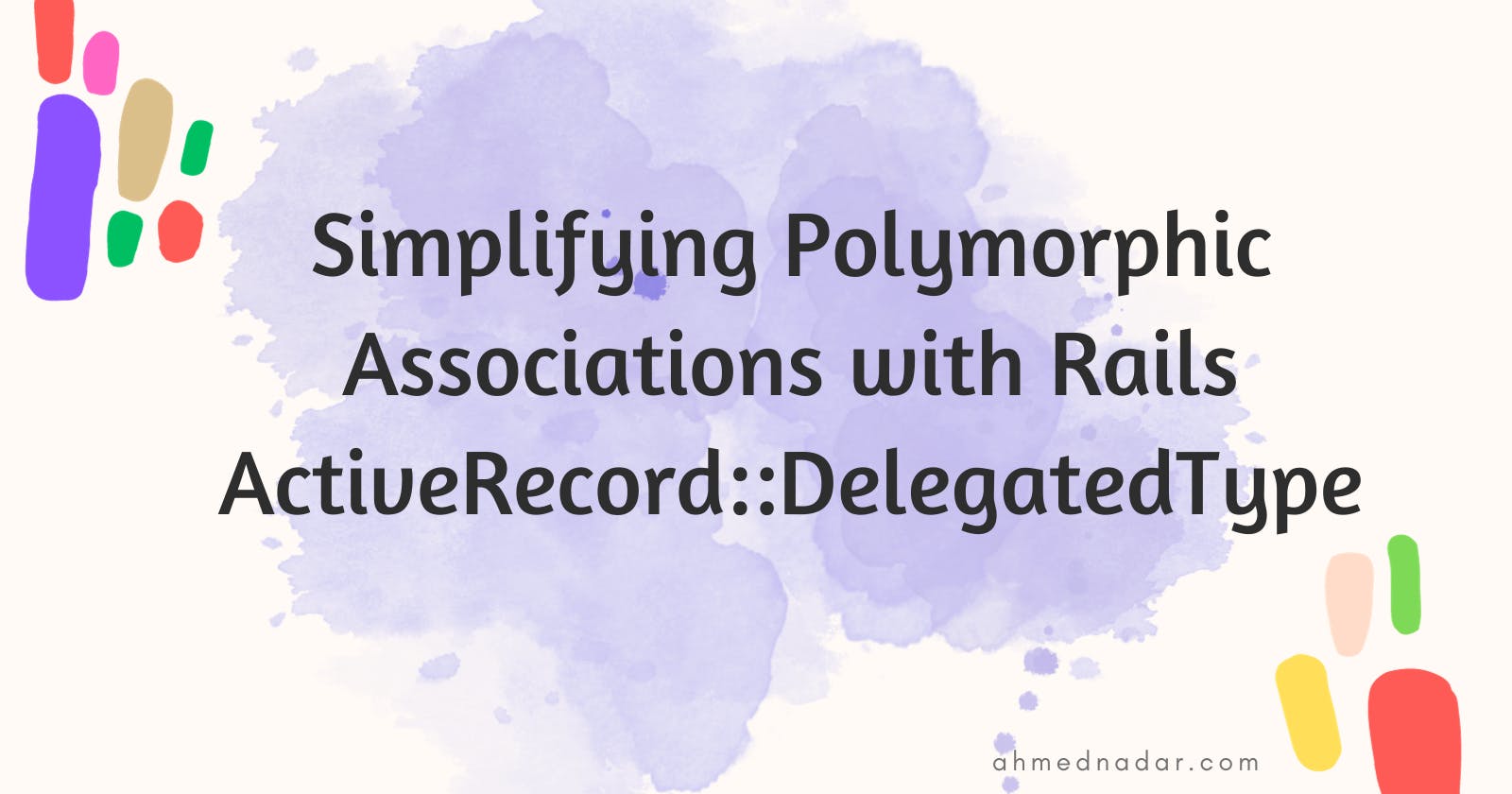Hey Rails dev! Ever struggled with handling different types of data in your Rails applications? Well, ActiveRecord::DelegatedType is here to make your life easier. In this guide, I'll walk through how you can use DelegatedType to manage diverse data relationships in a more organized way. It's like having a neat filing system for your database tables. So, let's dive in and explore how DelegatedType can help you keep your Rails projects well-structured and easy to maintain.
What is DelegatedType?
Let's introduce ActiveRecord's DelegatedType.
It is a Rails pattern for managing polymorphic associations in a more structured and efficient way. Think of it as a way to store a superclass that can be subclassed using delegation instead of inheritance. It's like having a Swiss Army knife in your Rails ActiveRecord toolkit!
When to useDelegatedType?
Leverage DelegatedType when you need to:
Manage objects sharing common features and behaviours but requiring distinct handling.
Simplify complex relationships under a unified interface.
How: the core idea
At its core, DelegatedType simplifies the handling of models that can represent multiple types of related data without the complexity of Single Table Inheritance (STI).
For example, In a blog application with posts, comments, and authors objects, ActiveRecord::DelegatedType is very handy when you want to have a single model that can represent different types of related data.
Why, embrace DelegatedType?
Here’s why DelegatedType can be your best friend:
Simplifies Polymorphic Relationships: Manages different types of data under a unified interface.
Avoids STI Drawbacks: Prevents cluttering a single table with columns relevant to only specific types.
Enhances Code Readability: Clear separation of concerns, making it easier to understand and maintain.
Example scenario, Blog application
Consider a blog application with posts, comments, and authors objects, where posts and comments share common features but also have unique attributes.
Step-by-Step Implementation
1. Define a Common Interface
Create a module, say Publishable, to encapsulate shared logic and behaviour.
# app/models/concerns/publishable.rb
module Publishable
extend ActiveSupport::Concern
included do
has_one :publication, as: :publishable, touch: true
# Other shared logic...
end
end
2. Create a Superclass Model
Define a Publication model to act as a superclass using delegated_type.
# app/models/publication.rb
class Publication < ApplicationRecord
delegated_type :publishable, types: %w[ Post Comment ]
belongs_to :author
# Common logic like publication date and author references
end
3. Define Subclasses
Implement Post and Comment models, including the Publishable module.
class Post < ApplicationRecord
include Publishable
# Attributes specific to posts
end
class Comment < ApplicationRecord
include Publishable
# Attributes specific to comments
end
4. Handling Records
Create Publications that are either Posts or Comments.
# Creating a new post
Publication.create!(publishable: Post.new(title: 'My First Post'), author: some_author)
# Creating a new comment
Publication.create!(publishable: Comment.new(content: 'Great post!'), author: another_author)
Or generate seed data.
Advanced Use Cases
Nested Attributes
You can use nested attributes to handle form submissions for both posts and comments through the Publication model.
class Publication < ApplicationRecord
accepts_nested_attributes_for :publishable
# ...
end
Delegating Methods
Delegating methods to the subclasses can streamline accessing subclass-specific attributes.
class Publication < ApplicationRecord
# Delegating a method (e.g., title for Post, content for Comment) to the publishable object
delegate :title, :content, to: :publishable, allow_nil: true
end
Querying
Querying is straightforward; you can fetch either all publications, just posts, or just comments.
# Fetch all publications
publications = Publication.all
# Fetch all posts
posts = Publication.posts
# Fetch all comments
comments = Publication.comments
📋 Conclusion
As we have seen ActiveRecord::DelegatedType offers a robust and flexible way to handle polymorphic associations. You can effectively implement and leverage this pattern, enhancing the structure and maintainability of your Rails applications.
💻 Demo repo
Now, curious to see ActiveRecord::DelegatedType in action? I've created a demo Rails app that showcases the usage of DelegatedType for managing polymorphic associations, along with advanced use cases. In addition, the app includes views to demonstrate the display of all posts and publications, making it a handy tool for app admins who need to oversee various data objects at once. You can check out the demo and explore the code on GitHub.
📚 Further Learning
For more in-depth examples and advanced use cases, check Rails DelegatedType API documentation.

